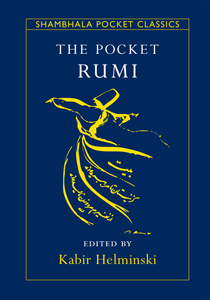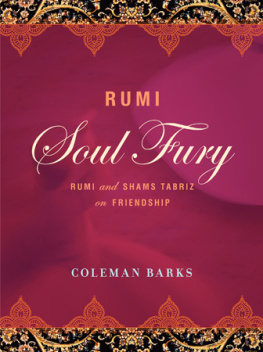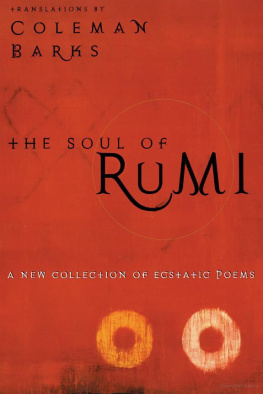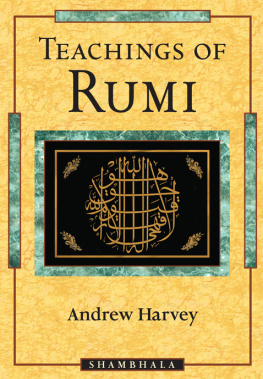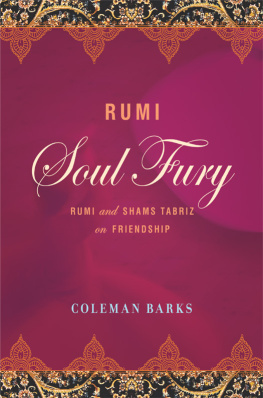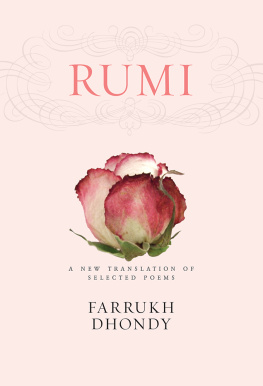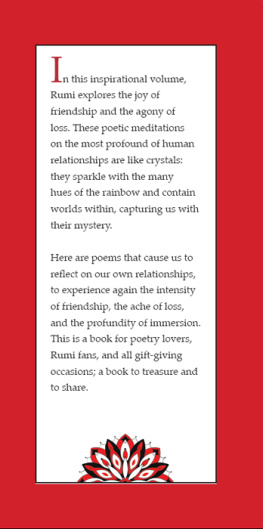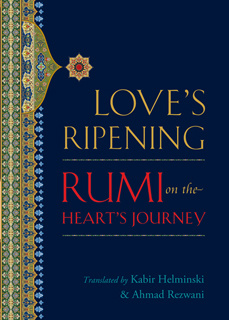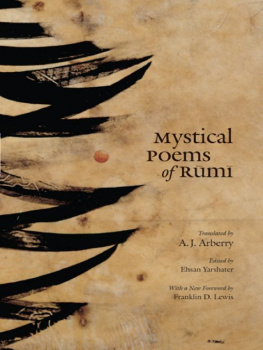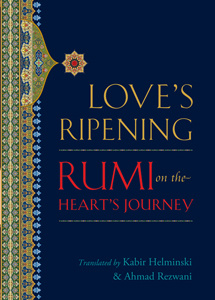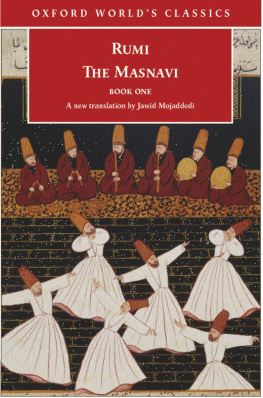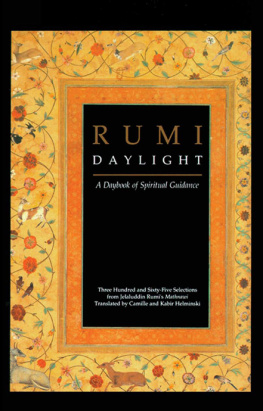Jelaluddin Rumi - The Rumi Collection
Here you can read online Jelaluddin Rumi - The Rumi Collection full text of the book (entire story) in english for free. Download pdf and epub, get meaning, cover and reviews about this ebook. publisher: Shambhala, genre: Art. Description of the work, (preface) as well as reviews are available. Best literature library LitArk.com created for fans of good reading and offers a wide selection of genres:
Romance novel
Science fiction
Adventure
Detective
Science
History
Home and family
Prose
Art
Politics
Computer
Non-fiction
Religion
Business
Children
Humor
Choose a favorite category and find really read worthwhile books. Enjoy immersion in the world of imagination, feel the emotions of the characters or learn something new for yourself, make an fascinating discovery.
- Book:The Rumi Collection
- Author:
- Publisher:Shambhala
- Genre:
- Rating:5 / 5
- Favourites:Add to favourites
- Your mark:
- 100
- 1
- 2
- 3
- 4
- 5
The Rumi Collection: summary, description and annotation
We offer to read an annotation, description, summary or preface (depends on what the author of the book "The Rumi Collection" wrote himself). If you haven't found the necessary information about the book — write in the comments, we will try to find it.
The Rumi Collection — read online for free the complete book (whole text) full work
Below is the text of the book, divided by pages. System saving the place of the last page read, allows you to conveniently read the book "The Rumi Collection" online for free, without having to search again every time where you left off. Put a bookmark, and you can go to the page where you finished reading at any time.
Font size:
Interval:
Bookmark:
ABOUT THE BOOK Rumis poems are beloved for their touching perceptions of humanity and the Divine. Here is a rich introduction to the work of the great mystical poet, featuring leading literary translations of his verse. Translators include Coleman Barks, Robert Bly, Andrew Harvey, Kabir Helminski, Camille Helminski, Daniel Liebert, and Peter Lamborn Wilson. To display the major themes of Rumis work, each of the eighteen chapters in this anthology are arranged topically, such as The Inner Work, The Ego Animal, Passion for God, Praise, and Purity. Also contained here is a biography of Rumi by Andrew Harvey, as well as an introductory essay by Kabir Helminski on the art of translating Rumis work into English. KABIR HELMINSKI is the author of Living Presence: A Sufi Way to Mindfulness and the Essential Self, as well as the translator of numerous books of Sufi literature and especially Rumi.
He is the codirector, with his wife, Camille Helminski, of the Threshold Society, a nonprofit organization dedicated to sharing the knowledge and practice of Sufism. As the publisher of Threshold Books for some twenty years, he was largely responsible for making Rumi the most widely read poet of our time. As a producer and writer of Sufi music, he has gained recognition for numerous recordings, including his own Garden within the Flames. He is a representative of the Mevlevi tradition founded by Jalaluddin Rumi. Sign up to learn more about our books and receive special offers from Shambhala Publications.  THE RUMI COLLECTION
THE RUMI COLLECTION  An Anthology of Translations of Mevlna Jalluddin Rumi Selected and edited by KABIR HELMINSKI With an introduction by ANDREW HARVEY
An Anthology of Translations of Mevlna Jalluddin Rumi Selected and edited by KABIR HELMINSKI With an introduction by ANDREW HARVEY  SHAMBHALA Boston & London 2012 FRONTISPIECE: Ebru by Feridun Ozgoren, Ya Hazrati Mevlana, Hoc Dost. SHAMBHALA PUBLICATIONS, INC.
SHAMBHALA Boston & London 2012 FRONTISPIECE: Ebru by Feridun Ozgoren, Ya Hazrati Mevlana, Hoc Dost. SHAMBHALA PUBLICATIONS, INC.  THE RUMI COLLECTION
THE RUMI COLLECTION  An Anthology of Translations of Mevlna Jalluddin Rumi Selected and edited by KABIR HELMINSKI With an introduction by ANDREW HARVEY
An Anthology of Translations of Mevlna Jalluddin Rumi Selected and edited by KABIR HELMINSKI With an introduction by ANDREW HARVEY  SHAMBHALA Boston & London 2012 FRONTISPIECE: Ebru by Feridun Ozgoren, Ya Hazrati Mevlana, Hoc Dost. SHAMBHALA PUBLICATIONS, INC.
SHAMBHALA Boston & London 2012 FRONTISPIECE: Ebru by Feridun Ozgoren, Ya Hazrati Mevlana, Hoc Dost. SHAMBHALA PUBLICATIONS, INC.
Horticultural Hall 300 Massachusetts Avenue Boston, Massachusetts 02115 www.shambhala.com 1998 by Kabir Helminski Published by agreement with Threshold Books Cover art: Jelluddin Rumi. Detail from a 17th18th century Persian manuscript in the Staatsbibliothek zu Berlin, Berlin, Germany. Used with permission of Bildarchiv Preussischer Kulturbesitz/Art Resource, N.Y. All rights reserved. No part of this book may be reproduced in any form or by any means, electronic or mechanical, including photocopying, recording, or by any information storage and retrieval system, without permission in writing from the publisher. English. 1999] The Rumi collection: an anthology of translations of Mevlna Jalluddin Rumi/selected and edited by Kabir Helminski. p. cm. cm.
Includes bibliographical references (p. ). eISBN 978-0-8348-2516-1 ISBN 157062531X (hardcover) ISBN 1570627177 (pbk.) ISBN 1590302516 (Shambhala Library) I. Helminski, Kabir, 1947 . II. Title ACKNOWLEDGMENTS I WOULD LIKE TO THANK the poet John Peck for his thoughtful reading of this material; the poets Andy Gaus, Michael Wolfe, and Richard Wilbur for sharing their love of the craft of poetry so many years ago; Rabia Kathleen Seidel for her part in researching and preparing the manuscript and the accompanying bibliography; Barbara Campman, Nanci Dailey, Gail Peach, and Lora Zorian, among others, careful listeners who followed the unfolding of all this for so many years at Threshold; and my wife, Camille, for her selfless dedication to everything having to do with Mevlna.
R UMI, THE GREATEST mystic poet of Islam and perhaps of the world, was born in Balkh, in what was then known as the province of Khorassan (now Afghanistan), on September 30, 1207. He died in Konya, in southern Turkey, in his sixty-seventh year, on December 17, 1273, leaving behind him, as a testimony to a life lived on the wildest and greatest heights of the spirit, the Mathnawi, a mystical epic in six volumes; the Divan-i-Kabir, a collection of thirty-five hundred odes and two thousand quatrains; a book of discourses; and several volumes of letters. After his death, his son, Sultan Valad, crystallized his vision and spiritual practices into the structures of the Mevlevi order, which endured persecution and oppression in many eras, to spread Rumis vision all over the Islamic world. Now, through the work and pioneering efforts of European and American translators, Rumis work is as famous in the West as it has been in the East, cherished by seekers on all paths. What Rumi in his life and work combined at the highest level was the philosophical interest of a Plato, the emotional grandeur and vision of a Christ or Buddha, and the extravagant literary gift of a Shakespeare. Rumi could, in fact, be called the Shakespeare of mystics, for, just as Shakespeare explored all the nuances of human character and of the play of Good and Evil, so Rumi, in his astonishingly rich and complex oeuvre, explored all of the aspects of the extreme, gorgeous drama of the souls journey to God.
Rumis real name was Jalluddin. Rumi is derived from Rum, the region of Anatolia, in Turkey, where he eventually settled. His family was a highly distinguished one of jurists and religious scholars who traced their lineage back to to Abu Bakr, one of the companions of the Prophet Muhammad, and the first caliph after Muhammads death. His father, Bahaduddin Valad (whom Rumi venerated) was a famous theologian, Sufi master, and visionary, called by his contemporaries The Sultan of Scholars. What little survives of his writings shows him to have been a passionate and exalted mystic, like his son. The epoch Rumi was born into was, like ours, one of chaotic violence and turmoil.
The Seljuk Empire was menaced from within by political and religious decadence and from without by Christian invaders from the West and the Mongol armies of Genghis Khan from the East. Rumis life and spirit were seared early on by this turmoil. At the age of twelve, in 1219, he was forced to flee Balkh with his father, who was being attacked by religious enemies and who foresaw the taking of the city by the Mongols, which would occur a year later. For a decade, Rumi and his family wandered all over Asia Minor and Arabia. They are said to have made the pilgrimage to Mecca and to have stopped on the way at Nishapur, in central Iran, where the young Rumi met the great Persian mystic Attar, author of The Conference of the Birds, who said of him, This boy will open a gate in the heart of love and throw a flame into the heart of all mystic lovers. Later in his travels, Rumi also went to Damascus, where he met Ibn Arabi, the greatest Sufi philosopher and metaphysician of his age.
The legend goes that when Ibn Arabi saw Rumi walking behind his father, he exclaimed, Glory be to God, an ocean is walking behind a lake. At eighteen, Rumi married Gavher-Kathoum, the beautiful daughter of Hodja Charifod, a grandee of Samarkand, and fathered two sons with her. After stays in Laranda and Arzanian, in Armenia, Rumis father was invited, in 1229, by Alaudin Kaykobad, the sultan of Konya in southern Turkey, to go and live there. The sultan built a college for him in Konya, where he taught for two years, until his death in 1231. Immediately afterward, Rumi was chosen to be his successor. Already his brilliance and spiritual depth had made him preeminent in his world.
Next pageFont size:
Interval:
Bookmark:
Similar books «The Rumi Collection»
Look at similar books to The Rumi Collection. We have selected literature similar in name and meaning in the hope of providing readers with more options to find new, interesting, not yet read works.
Discussion, reviews of the book The Rumi Collection and just readers' own opinions. Leave your comments, write what you think about the work, its meaning or the main characters. Specify what exactly you liked and what you didn't like, and why you think so.

